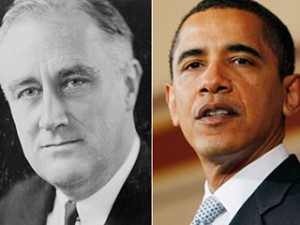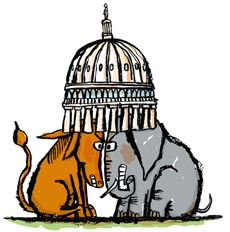 If tonight’s mid-term election turns out the way the polls are suggesting we might witness a historic swing right in the Legislative Body. The Republicans need to pick up 40 seats to regain the House majority they lost in 2006 and most political analysists say that is a forgone conclusion. There are a 100 plus Congressional districts up for grabs and the gains for the Republicans could be in the 80s according to some. Currently Real Clear Politics is reporting that 44 seats are safe for the Democrats and 49 for the Republicans, while 42 remain “up for grabs.” If the Republicans gain a significant number of those “up for grab seats,” they could see a 70 to 80 seat swing.
If tonight’s mid-term election turns out the way the polls are suggesting we might witness a historic swing right in the Legislative Body. The Republicans need to pick up 40 seats to regain the House majority they lost in 2006 and most political analysists say that is a forgone conclusion. There are a 100 plus Congressional districts up for grabs and the gains for the Republicans could be in the 80s according to some. Currently Real Clear Politics is reporting that 44 seats are safe for the Democrats and 49 for the Republicans, while 42 remain “up for grabs.” If the Republicans gain a significant number of those “up for grab seats,” they could see a 70 to 80 seat swing.
This type of potential “swing” is not uncommon in times of economic downturns. Let’s look at some past “historic” elections.
The first Financial panic in 1893 set the stage for a series of sharp swings in the 1890s. Republicans won a landslide in 1894, picking up 135 seats, but then lost 48 seats two years later, despite Republican William McKinley’s triumph in the presidential race.
Then, in 1910, labor unrest and divisions within the GOP cost the party 57 House seats that year and 28 in 1912. World War I and its aftermath created a period of almost continual seesawing, with only one election (1916) seeing fewer than 20 House seats changing hands. [Source]
 Another realignment at the beginning of the Great Depression when Franklin D. Roosevelt was elected in 1932 that saw the Republicans swept from the House (101 in all) and 9 from the Senate and marked the start of a Democratic dominance of Congress that lasted for nearly three decades.
Another realignment at the beginning of the Great Depression when Franklin D. Roosevelt was elected in 1932 that saw the Republicans swept from the House (101 in all) and 9 from the Senate and marked the start of a Democratic dominance of Congress that lasted for nearly three decades.
Since the end of World War II (1946 to 1952) neither party had lost more than 20 seats. However, in 1946 post-war strikes combined with low approval for President Truman, saw Republicans gain 55 seats which gave them the House for the first time since 1928.
Two years later, voters reacted to a “do-nothing Congress” by tossing out 75 Republicans. The GOP regained the House in 1952, but lost control in the next election. That drought would hold until Republicans roared back in 1994. [ibid]
Will the Republicans control the House much like the Democrats did in the 1930s? Historically it depends on the economy and/or war. The United States tends to shift in times of economic strife and not in times of war, though the 1930s proves that war trumps economy when in 2010 that will not be the case.